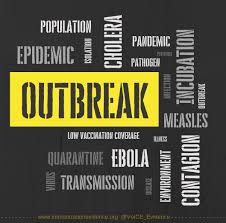Training course on Management of Specific Outbreaks: Cholera, Measles, and Ebola
Training Course on Management of Specific Outbreaks is designed for public health professionals, epidemiologists, and healthcare workers involved in outbreak response and management.

Course Overview
Training Course on Management of Specific Outbreaks: Cholera, Measles, and Ebola
Training Course on Management of Specific Outbreaks is designed for public health professionals, epidemiologists, and healthcare workers involved in outbreak response and management. This course focuses on the strategies and best practices for managing specific infectious disease outbreaks, including cholera, measles, and Ebola. Participants will learn about the unique characteristics of each disease, the public health responses required, and the importance of context-specific strategies.
Effective outbreak management is crucial for minimizing morbidity and mortality. This course equips participants with the skills necessary to respond to outbreaks effectively, using evidence-based approaches tailored to the specific challenges posed by each disease. Through interactive workshops, case studies, and practical exercises, attendees will gain hands-on experience in outbreak management.
Course Objectives
- Understand the epidemiology and transmission dynamics of cholera, measles, and Ebola.
- Identify key strategies for outbreak detection and response.
- Develop skills to implement effective case management and control measures.
- Engage communities in outbreak prevention and response efforts.
- Explore case studies of successful outbreak management.
- Advocate for policies that support outbreak preparedness and response.
- Prepare for emerging challenges in outbreak management.
- Utilize data for informed decision-making during outbreaks.
- Assess the impact of interventions on outbreak control.
- Foster collaboration among stakeholders during outbreaks.
- Design training programs for healthcare workers on outbreak management.
- Evaluate the role of vaccination and preventive measures in outbreak control.
- Integrate cultural considerations into outbreak response strategies to enhance community acceptance.
Target Audience
- Public health professionals
- Epidemiologists
- Healthcare providers
- Community health workers
- Policy makers
- Medical students
- Researchers
- Emergency response teams
Course Duration: 5 Days
Course Modules
Module 1: Overview of Infectious Disease Outbreaks
- Understanding the nature and impact of infectious disease outbreaks.
- Overview of outbreak investigation processes.
- Key terms and definitions related to outbreak management.
- Current trends and challenges in outbreak response.
- The role of public health in outbreak management.
Module 2: Cholera Outbreak Management
- Epidemiology and transmission of cholera.
- Key strategies for cholera outbreak detection and response.
- Implementing water, sanitation, and hygiene (WASH) interventions.
- Case management of cholera patients.
- Community engagement and education during cholera outbreaks.
- Case studies of successful cholera outbreak responses.
Module 3: Measles Outbreak Management
- Epidemiology and transmission of measles.
- Strategies for measles outbreak detection and response.
- Importance of vaccination in outbreak prevention.
- Implementing surveillance and case investigation.
- Community mobilization for vaccination campaigns.
- Case studies of successful measles outbreak management.
Module 4: Ebola Outbreak Management
- Understanding Ebola virus disease and its transmission.
- Key strategies for Ebola outbreak detection and response.
- Implementing infection prevention and control measures.
- Case management and supportive care for Ebola patients.
- Engaging communities in Ebola response efforts.
- Case studies of successful Ebola outbreak responses.
Module 5: Integrated Outbreak Response Strategies
- The importance of a coordinated response to outbreaks.
- Engaging multiple stakeholders (government, NGOs, communities).
- Developing comprehensive outbreak response plans.
- Utilizing technology for outbreak surveillance and response.
- Evaluating the effectiveness of outbreak response strategies.
Module 6: Communication in Outbreak Management
- The role of communication in outbreak response.
- Strategies for effective risk communication.
- Engaging the media and the public during outbreaks.
- Addressing misinformation and stigma.
- Evaluating communication efforts during outbreaks.
Module 7: Policy and Advocacy for Outbreak Preparedness
- Understanding the policy landscape for outbreak management.
- Strategies for advocating for supportive policies.
- Engaging policymakers in discussions about preparedness.
- Case studies of successful policy advocacy in outbreak management.
- Evaluating the impact of policies on outbreak response.
Module 8: Future Directions and Challenges in Outbreak Management
- Emerging infectious diseases and the threat of outbreaks.
- Innovations in outbreak detection and response.
- Preparing for future challenges in disease management.
- Global perspectives on outbreak management strategies.
- Building resilient health systems for effective outbreak response.
Training Methodology
- Interactive Workshops: Facilitated discussions, group exercises, and problem-solving activities.
- Case Studies: Real-world examples to illustrate effective outbreak management practices.
- Role-Playing and Simulations: Practice decision-making in outbreak scenarios.
- Expert Presentations: Insights from experienced public health professionals and outbreak responders.
- Group Projects: Collaborative development of outbreak response plans.
- Action Planning: Development of personalized action plans for outbreak management.
- Digital Tools and Resources: Utilization of online platforms for collaboration and learning.
- Peer-to-Peer Learning: Sharing experiences and insights on outbreak management.
- Post-Training Support: Access to online forums, mentorship, and continued learning resources.
Register as a group from 3 participants for a Discount
Send us an email: info@datastatresearch.org or call +254724527104
Certification
Upon successful completion of this training, participants will be issued with a globally recognized certificate.
Tailor-Made Course
We also offer tailor-made courses based on your needs.
Key Notes
- Participants must be conversant in English.
- Upon completion of training, participants will receive an Authorized Training Certificate.
- The course duration is flexible and can be modified to fit any number of days.
- Course fee includes facilitation, training materials, 2 coffee breaks, buffet lunch, and a Certificate upon successful completion.
- One-year post-training support, consultation, and coaching provided after the course.
- Payment should be made at least a week before the training commencement to DATASTAT CONSULTANCY LTD account, as indicated in the invoice, to enable better preparation.